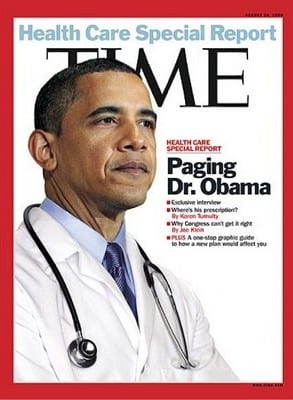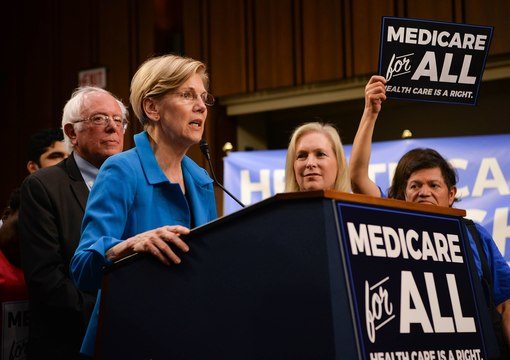Patrice Greanville
 [dropcap]H[/dropcap]ealthcare is a never-ending topic in capitalist nations—even those that seem to boast excellent systems with universal access guaranteed to all. Such is the case in Germany, Italy, France, Spain and Britain, for example (the latter being one of the first in the postwar period to inaugurate a really socialized system—the NHS), and also Canada, which uses a more conventional hybrid approach, part capitalist, part state. This kind of endless fretting and argumentation is inherent in any deeply class divided society that, after much delay, chooses to embrace a socialist idea to solve a major problem. Socialist islands are in constant danger when floating in a capitalist ocean. On this aspect of the issue, more below.
[dropcap]H[/dropcap]ealthcare is a never-ending topic in capitalist nations—even those that seem to boast excellent systems with universal access guaranteed to all. Such is the case in Germany, Italy, France, Spain and Britain, for example (the latter being one of the first in the postwar period to inaugurate a really socialized system—the NHS), and also Canada, which uses a more conventional hybrid approach, part capitalist, part state. This kind of endless fretting and argumentation is inherent in any deeply class divided society that, after much delay, chooses to embrace a socialist idea to solve a major problem. Socialist islands are in constant danger when floating in a capitalist ocean. On this aspect of the issue, more below.
As most of us know, the US tops all nations for the degree of rancor underlining the discussion, the artificially idiotic complexity of its historical "solutions" (i.e., Obamacare) and the astonishing degree of disinformation permeating the topic, not surprising since the corporate media are also part of the billionaires' club controlling the US economy and all its crucial institutions.
Below, we have reproduced Al Klein's contribution, one of the best replies we could find among the many submitted to this provocatively stupid question on Quora (something common to detonate a high response rate). The writer presents—in ironic tones—a good picture of what Medicare is all about, and its solid socialist DNA. Ditto for the VA, one of the best socialized medicine systems around, despite the constant badmouthing by the media. (Our senior associate editor, David Pear, a longtime VA user and believer in its quality, is busy preparing an article on this very topic).
Too bad Mr Klein forgot to mention that Medicare remains terrific (when compared to the still prevalent private-insurance Darwinian system in place), despite the fact it was enacted with deliberate flaws, like that man-made, not God-ordained 80% cap to coverage, which vultures in the "supplemental insurance" racket, like United Healthcare, and the AARP itself, have used to great effect to line their pockets even more. Indeed, it didn't have to be that way at all, as proven by many countries—capitalist countries, mind you—that never even considered such a ridiculus and treacherous clause. The fact this outrageous built-in flaw is so little noticed by most Americans, let alone protested, is testament to their passivity and confusion, and to their lack of genuine leadership. Watch the tv spot below, and observe how these hustlers make it sound like the Medicare "up to 80% coverage" is something like a divine rule instead of an arbitrary piece of rotten legislation that should have been fixed ages ago:
Incidentally, contrary to what appears to be its stated mission, to help senior citizens, for the most part AARP has done absolutely nothing to help in this regard, in fact it continues to profit mightily from this flaw by allying itself with the insurance racquet.
Meanwhile, as US capitalism and its imperialist incubus enter at last their phase of decline, and the ruling class looks for more ways to inject "austerity" among the hoi polloi while still enjoying the protection of its absurdly bloated and expensive military, the muscle they use to preserve their lucrative hegemony around the globe, the choir from the bought politicians and pundits grows louder in their insistence to "fix" Medicare and Social Security "entitlements" that, they claim, we can't afford, an absurd statement in a nation that spends a trillion dollars a year on "defence" against enemies it literally invents. Drastic measures are in order, say these experts, including privatisation as the favorite option. Man, how predictable these charlatans are.
If there is no crisis, let's create one
Since Medicare and Social Security in the US, and the NHS in Britain, as well as similar programs in other nations, are deeply esteemed and embraced by the vast majority of the population, the ruling class is working hard to make them look inefficient and financially unsustainable.
Unsustainable by design
The Judases in Congress and media clamoring for reform in the name of a non-existent threat of social security financial collapse base themselves on dubious longterm projections that, theoretically, might pose a small risk to the SSA payouts. The crux of the matter is in (again) the artificial and ludicrously low arbitrary cap Congress set up for social security taxes on earnings, an obvious bow to the rich who certainly did not want to "subsidise" their less fortunate countrymen, even though social security checks would also be higher for those who would contribute more. It follows that the obvious cure to this fabricated crisis is simply to lift the cap on earnings entirely. In 2018, the Social Security wage base was $128,400. That means that you'll have to pay Social Security payroll taxes only up to $128,400, which works out to a maximum of 6.2 percent of that figure, or $7,960.80. With much fanfare this was raised for 2019 to a maximum taxable of $132,900. Anyone can see the umpteen billions that the treasury is losing each year by embracing this idiotic tax template of no benefit to anyone, except the uber pampered 1%.
Tripping Medicare, Social Security, the NHS and other social safety net programs
As mentioned above, for pretty obvious reasons social safety programs enjoy enormous support in every country where they have been enacted. In the late 1980s, toward the end of her disastrous reign, Margaret Thatcher, as vicious a reactionary as any seen in Britain before or after, triggered a firestorm when she seemed intent on tweaking the NHS out of existence. Arrogant by nature, Thatcher miscalculated, she had simply gone too far. A paper published in 1989 by two social scientists commenting on opinion shifts in Britain in regard to healthcare, noted that,
In the United Kingdom, the public is generally more accepting of changes in policy than are the populations of many other countries. But that docility often changes when it comes to the subject of Britain's national Health Service (NHS). Indeed, politicians of every persuasion in the United Kingdom seem duty- bound not to be seen as attacking the NHS. The NHS became a particular source of controversy in 1989 because British Prime Minister Margaret Thatcher proposed some major reforms through a White Paper that was tabled in January...(Robert J. Blendon and Karen Donelan, Health Affairs, Winter 1989).
Thatcher was trying to privatise the NHS after a long period of mostly hidden and gradual defunding and sabotaging of the program, causing shortages of personnel and sometimes critical assets, all designed to spark grousing among the end consumers, while providing ammo to the standby critics ready with their capitalist solutions. As the cited paper notes,
Since 1979, twenty government-controlled enterprises have been sold to private groups, including British Telephone, Sealink (ferries), British Aerospace, British Gas, Rolls-Royce, and Associated British Ports (seaports). Throughout this period, the Thatcher government has led Europe in the aggressive pursuit of privatization. (op. cit, p. 54)
The NHS was to be Thatcher's crowning achievement, her major gift to the capitalists, after a tenure that boasted a large slew of privatisations. As Blendon and Donelan point out, in keeping with the phrase, "rolling back the frontiers of public sector," the Conservative Party advocated the transfer of ownership of government businesses and services to the private sector and the introduction of [supposedly] more competitive market forces." While the British public, bamboozled as usual by the capitalist media, had basically gone along with many of Thatcher's "market reforms," endorsing the shifts with almost a 50% approval vote, the situation was different when it came to foundational programs like the NHS. Here, instead of a frontal assault, deviousness was in order. And deviousness was plotted and delivered.
Because the assault on the NHS (which continues in this era of naked "neoliberal austerity" rollbacks) is a roadmap to the underhanded ways the capitalist ruling class may also use in the US to destroy the viability of our social safety net, I quote again Blendon and Donelan, who provide an apt summary of the privatisers' maneuvers:
Unlike the cases of British Natural Gas or Sealink, however, it has not been considered politically feasible or, to many, desirable to transfer the NHS to the private sector. In 1979, the Conservative Party raised this issue in its election manifesto but retreated from it by 1983.10 Instead, a series of more intermediate and, as Thatcher's time in office increased, more dramatic proposals emerged to reform the British health care system. These included: (1) encouraging the growth of a parallel track of private medicine and health insurance; (2) restraining public-sector spending for health (the proposed rate for real growth was to be 0.5 percent per year for a decade); (3) decentralizing the management of the NHS; and (4) providing more incentives for choice and competition among hospitals and physicians in the government service. Included within these were the more recent proposals presented in a new White Paper to create an "internal" market system within the governmentally owned NHS.11 (op.cit, p. 54)
One has to be wilfully blind not to see in these proposals a plan to boil the legendary frog in the pot little by little, for what these people are doing is simply injecting ever larger doses of capitalist poisons in an otherwise healthy socialised, or nationalised, if you will, system to provoke its eventual self-liquidation. It's a program of synergistic evisceration of the NHS' socialist DNA, all conducted in the name of making the NHS more efficient and financially sound. I suppose this is inevitable for any exemplary socialist island in a capitalist sea. But it does remind us of the old imperial formula of destroying the village in order to save it. Haven't we seen this horrid nonsense before?
I admit that my visceral dislike of capitalist chicanery and inherent criminality in anything it touches colors my perceptions; after all I've been watching this system cynically cheat, murder and steal for more than 50 years now and I have yet to see one instance in which it proved superior, or more honest, than a comparable socialist plan. So, we must ask, is there reliable data showing that the capitalist choir was right after all? If there is, I'll concede. But the short answer is NO:
In the broader debate over the role of the private versus the public sector in providing more efficient services, the NHS was one entity for which comparative data already existed. In fact, independent studies showed that Great Britain, with its government-dominated system, spent less of its economy on health and medical care than did eighteen other major industrialized countries, many of which had more private, market-oriented systems. At 6.1 percent of its economy (gross domestic product, or GDP), Great Britain devoted only slightly more of its national resources to health than its poorer neighbor, Spain (6 per- cent). Likewise, Britain's health expenditures of $758 per person per year were dramatically less than those of its sister English-speaking countries, Canada ($1,483 U.S.) and the United States ($2,051). (op. cit, p 55, Winter 1989)
In Conclusion
The British case is a stern warning to those in the US who watch with bovine passivity (the default mode for most Americans) their treacherous politicians and media whores discuss "the need" to privatise social security and Medicare in the name of saving the programs from bankruptcy, or simply because of never clearly explained "budget deficits".
Stealth defunding of Medicare and social security, (the latter wounded at inception by a scandalously low arbitrary tax cap on earnings, as noted earlier) is aimed at creating an operational crisis, giving ammo to those in favor of Wall Street formulas to pulverise the socialist aspects of both systems, an old heatfelt desire of the insatiable US plutocracy.
It's fair to say that, combined, these two underhanded assaults on these essential programs, especially in an age of high economic instability and likely economic implosions on account of the very same factors that precipitated the Great Recession of 2008 (which never really ended), are akin to a regime of "internal sanctions" aimed at the heart of the American population. Yes, the capitalists do not just impose sanctions and economic sabotage on foreign nations they wish to bend to their will. They do that, too, to attain domestic objectives.
Given its savage and rarely questioned capitalist culture, underscored by a constant demonisation of socialism, most Americans have difficulty visualising a universal medical system based on the simple idea of healthcare for all, no questions asked. It's about time the American people forbade the profit system from playing any part in the dispensation of health services.
QUESTION: An American doctor told me that the only reason other countries could have universal healthcare was because the USA was paying for their defence.
Has anyone else heard this?
Al Klein, 46 years of hardware and software development - retired
You’re probably too young to remember the horror stories we were told about Medicare. You’d be forced to use the doctor you were told to use (not true - I choose my doctors - from among all the doctors close enough for me to get to), there would be months to wait to see a doctor (not true - I suffered from a massive infection just over 2 years ago, and was in the ICU before I regained consciousness a few days later), all sorts of nonsense. I paid about $50 to have 5 stents put into my heart (the cardiologist was a fussbudget), including the overnight hospital stay. ($50 for just a day in the hospital? Yes. And a cardiologist, and a catherization lab, and the nurses, and everything else. And 4 meals. You can hardly get 4 decent meals for that.) I pay about $32 a year for a total of about 12 medications that I take daily (because one of them isn’t a generic - the rest of them cost me $0.00 each).
It’s terrible the way the government treats me. Twelve whole dollars every year for medications?
A single payer system would extend what I have to people too young for Medicare. But the CEOs of the insurance companies would have to give up their multimillion dollar annual “salaries”. And we can’t have that, can we? (Oh, and we already spend so much more on the military than the next 5 countries combined that cutting a little from the military budget would pay for the transition. But the military contractors can’t allow that, can they?) And, of course, the medical insurance companies would be out of business. Can‘t have that either, can we?
No, the scare tactics only work on people who don’t know the truth. I see a my primary care physician (the one I chose to go to, because she likes my sense of humor [hers is just as twisted] and she’s good) and pay the grand total of $0.00 per visit. She bills Medicare about $500. She’d lose that if we had a single-payer medical system - she’d get her salary as a government-employed doctor. That’s why doctors want you to be scared - so you’ll vote for the person who vows to never let “that socialist idea” happen. Huh? It already did. Social security isn’t called Democratic Security, is it? SS is a socialistic idea. Medicare is a single-payer system. The VA is a sing;e-payer system. And they’re both socialistic. They just want you younger people to line their pockets, since they lost all us older folks and all us veterans.
And if you fall for it, they’ll keep taking the money you’re shoveling into their pockets. $800/month for medical insurance? Hey, vote for people who want that, not something like “Obamacare”, which originally had premiums that were under $100/month (and less if you were poor).
Enjoy paying. You’re making that doctor very happy.

![]() This work is licensed under a Creative Commons Attribution-NonCommercial 4.0 International License
This work is licensed under a Creative Commons Attribution-NonCommercial 4.0 International License Keep truth and free speech alive by supporting this site.
Keep truth and free speech alive by supporting this site.![]() The big social media —Google, Facebook, Instagram, Twitter—are trying to silence us.
The big social media —Google, Facebook, Instagram, Twitter—are trying to silence us.












